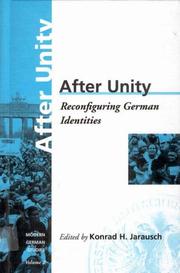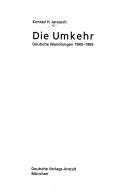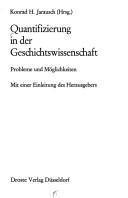| Listing 1 - 10 of 66 | << page >> |
Sort by
|
Book
ISBN: 9781400883479 Year: 2016 Publisher: Princeton, NJ
Abstract | Keywords | Export | Availability | Bookmark
 Loading...
Loading...Choose an application
- Reference Manager
- EndNote
- RefWorks (Direct export to RefWorks)

ISBN: 1571810412 1571810404 1789205719 Year: 1997 Publisher: Providence, R.I. Berghahn
Abstract | Keywords | Export | Availability | Bookmark
 Loading...
Loading...Choose an application
- Reference Manager
- EndNote
- RefWorks (Direct export to RefWorks)
The unification of Germany is the most important change in Central Europe in the last four decades. Understanding this rapid and unforeseen development has raised old fears as well as inspired new hopes. In order to make sense out of the bewildering process and to help both expert and lay readers understand the changes and consequences, an American historian and a German social scientist put together this collection of central texts on German unification, the first of its kind. An invaluable reference tool.
Internal politics --- anno 1990-1999 --- Germany --- Political culture --- Culture politique --- Allemagne --- Politics and government --- Ethnic relations. --- Politique et gouvernement --- Relations interethniques

ISBN: 3421056722 Year: 2004 Publisher: München : Deutsche Verlags-Anstalt,
Abstract | Keywords | Export | Availability | Bookmark
 Loading...
Loading...Choose an application
- Reference Manager
- EndNote
- RefWorks (Direct export to RefWorks)
Political culture --- Culture politique --- Germany --- Allemagne --- History --- Social conditions --- Economic conditions --- Histoire --- Conditions sociales --- Conditions économiques --- Conditions économiques --- ALLEMAGNE --- DENAZIFICATION --- GUERRE MONDIALE (1939-1945) --- TRANSITION DEMOCRATIQUE --- AMERICANISATION --- HISTOIRE --- 1945-1990 --- 1945 --- 1945-1995

ISBN: 3770003578 9783770003570 Year: 1976 Publisher: Düsseldorf: Droste,
Abstract | Keywords | Export | Availability | Bookmark
 Loading...
Loading...Choose an application
- Reference Manager
- EndNote
- RefWorks (Direct export to RefWorks)
Social sciences --- History --- Statistical methods --- 930.20 --- -Social sciences --- -Behavioral sciences --- Human sciences --- Sciences, Social --- Social science --- Social studies --- Civilization --- Annals --- Auxiliary sciences of history --- Kwantitatieve methoden en technieken in de geschiedwetenschap --- -Kwantitatieve methoden en technieken in de geschiedwetenschap --- 930.20 Kwantitatieve methoden en technieken in de geschiedwetenschap --- -930.20 Kwantitatieve methoden en technieken in de geschiedwetenschap --- Behavioral sciences --- Historiometry --- Methodology --- Social sciences - Statistical methods --- History - Statistical methods --- Social sciences - Germany (West) - Statistical methods
Book
ISBN: 0691053456 1306991048 1400855543 0691614245 0691641900 0691101310 9780691053455 9780691101316 Year: 1982 Publisher: Princeton (N.J.): Princeton university press,
Abstract | Keywords | Export | Availability | Bookmark
 Loading...
Loading...Choose an application
- Reference Manager
- EndNote
- RefWorks (Direct export to RefWorks)
Konrad H. Jarausch studies the social structure of the German university and the mentality of its students during the Imperial period as an example of a wider European academic desertion of liberalism. He finds that German higher education combined scientific world leadership and competent professional training with an eroding liberal education (Bildung) to create an educated class that was tragically susceptible to the appeal of the Third Reich.Originally published in 1982.The Princeton Legacy Library uses the latest print-on-demand technology to again make available previously out-of-print books from the distinguished backlist of Princeton University Press. These editions preserve the original texts of these important books while presenting them in durable paperback and hardcover editions. The goal of the Princeton Legacy Library is to vastly increase access to the rich scholarly heritage found in the thousands of books published by Princeton University Press since its founding in 1905.
Education, Higher --- Students --- History --- Political activity --- College students --- Higher education --- Postsecondary education --- Universities and colleges --- Pupils --- School life --- Student life and customs --- Persons --- Education --- Education, Higher - Germany - History - 19th century --- Students - Political activity - Germany - History - 19th century
Book
ISBN: 9780691226187 9780691200415 0691226180 0691200416 0691225532 Year: 2021 Publisher: Princeton, N.J. Princeton University Press
Abstract | Keywords | Export | Availability | Bookmark
 Loading...
Loading...Choose an application
- Reference Manager
- EndNote
- RefWorks (Direct export to RefWorks)
"Over the past decade, Euroskepticism has been on the rise, with many predicting the end of the European Union and the failure of progressive European values. With Brexit on the horizon, the far-right in power in Poland, authoritarianism on the rise in Hungary, riots in Paris, and austerity policies in place across the continent, it often seems that there is little reason to be optimistic about Europe's future or proud of its recent past. Konrad Jarausch begs to differ. In this book, which he will write as a Tony Judt-style extended essay, he traces the history of Europe since 1989 and finds much cause for hope. Despite the Greek debt crisis, the weak reaction to the Russian invasion of Eastern Ukraine, and other failures that Euroskeptics cite frequently, the European model is strong. Jarausch ends his narrative by pointing to successes, such as Danish efforts to combat global warming, Sweden's restructuring of its welfare system, and Spain's transition to democracy and its ability to cope with a large influx of immigrants, among many other issues. Though Europe has many challenges to overcome in the next few decades, it still presents a powerful alternative to American-style unbridled capitalism and right-wing populism. Jarausch will color his narrative with his own impressions of living in both Europe and the United States at various points during this period"--
International relations. Foreign policy --- European Union --- Europe --- Politics and government
Book
ISBN: 3608910670 Year: 1983 Publisher: Stuttgart Klett-Cotta
Abstract | Keywords | Export | Availability | Bookmark
 Loading...
Loading...Choose an application
- Reference Manager
- EndNote
- RefWorks (Direct export to RefWorks)
Book
Year: 2012 Publisher: Cologne Center for Historical Social Research
Abstract | Keywords | Export | Availability | Bookmark
 Loading...
Loading...Choose an application
- Reference Manager
- EndNote
- RefWorks (Direct export to RefWorks)
Book
ISBN: 9780691174587 069117458X 9780691196480 0691196486 1400889332 Year: 2018 Publisher: Princeton, New Jersey : Princeton University Press,
Abstract | Keywords | Export | Availability | Bookmark
 Loading...
Loading...Choose an application
- Reference Manager
- EndNote
- RefWorks (Direct export to RefWorks)
The gripping stories of ordinary Germans who lived through World War II, the Holocaust, and Cold War partition-but also recovery, reunification, and rehabilitationBroken Lives is a gripping account of the twentieth century as seen through the eyes of ordinary Germans who came of age under Hitler and whose lives were scarred and sometimes destroyed by what they saw and did.Drawing on six dozen memoirs by the generation of Germans born in the 1920s, Konrad Jarausch chronicles the unforgettable stories of people who not only lived through the Third Reich, World War II, the Holocaust, and Cold War partition, but also participated in Germany's astonishing postwar recovery, reunification, and rehabilitation. Written decades after the events, these testimonies, many of them unpublished, look back on the mistakes of young people caught up in the Nazi movement. In many, early enthusiasm turns to deep disillusionment as the price of complicity with a brutal dictatorship--fighting at the front, aerial bombardment at home, murder in the concentration camps-becomes clear.Bringing together the voices of men and women, perpetrators and victims, Broken Lives reveals the intimate human details of historical events and offers new insights about persistent questions. Why did so many Germans support Hitler through years of wartime sacrifice and Nazi inhumanity? How did they finally distance themselves from this racist dictatorship and come to embrace human rights? Jarausch argues that this generation's focus on its own suffering, often maligned by historians, ultimately led to a more critical understanding of national identity-one that helped transform Germany from a military aggressor into a pillar of European democracy.The result is a powerful account of the everyday experiences and troubling memories of average Germans who journeyed into, through, and out of the abyss of a dark century.
History of Germany and Austria --- anno 1900-1999 --- Political culture --- Economic history. --- Political culture. --- Social conditions. --- Alltag --- Lebenslauf --- Nationalbewusstsein --- BMBF-Statusseminar --- 1900-1999 --- Germany --- Germany. --- History --- Social conditions --- Economic conditions --- Social life and customs
Book
ISBN: 9781785330254 9780857459725 Year: 2013 Publisher: New York : Berghahn,
Abstract | Keywords | Export | Availability | Bookmark
 Loading...
Loading...Choose an application
- Reference Manager
- EndNote
- RefWorks (Direct export to RefWorks)
Germany --- Allemagne --- History --- Politics and government --- Economic conditions --- Social conditions --- Histoire --- Politique et gouvernement --- Conditions économiques --- Conditions sociales
| Listing 1 - 10 of 66 | << page >> |
Sort by
|

 Search
Search Feedback
Feedback About UniCat
About UniCat  Help
Help News
News